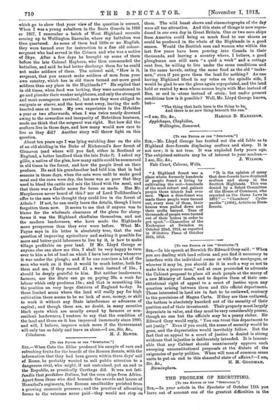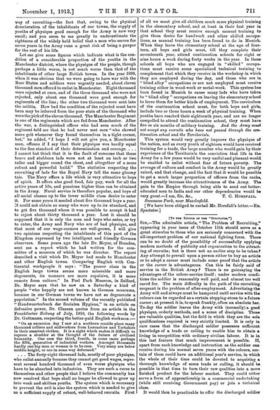THE PROBLEM OF RECRUITING.
[To THE EDITOR OF TUE "SPECTATOR:1 SIR,—In your article in the Spectator of October 11th you leave out of account one of the greatest difficulties in the
way of recruiting—the fact that, owing to the physical deterioration of the inhabitants of our towns, the supply of youths of physique good enough for the Army is now very small; and you seem to me greatly to underestimate the rightness of the widely held belief that a man who serves for seven years in the Army runs a great risk of being a pauper for the rest of his life.
Let me give some figures which indicate what is the con- dition of a considerable proportion of the youths in the Manchester district, where the physique of the people, though perhaps a little worse, is not much worse than that of the inhabitants of other large British towns. In the year 1899, When it was obvious that we were going to have war with the Boer States and soldiers were urgently needed, about eleven thousand men offered to enlist in Manchester. Eight thousand were rejected at once, and of the three thousand who were not rejected, only about one thousand were good enough for regiments of the line ; the other two thousand were sent into the militia. How bad the condition of the rejected must have been may be inferred from the poor state of the thousand who were the pick of the eleven thousand. The Manchester Regiment is one of the regiments which are fed from Manchester. After the war, a distinguished officer who had seen much of the regiment told me that he had never met men "who showed more grit whenever they found themselves in a tight corner, but," he added, "I hope I will not give you, a Manchester man, offence if I say that their physique was hardly equal to the fine standard of their determination and courage. . . . I cannot but think that it is the fault of someone that these brave and stubborn lads were not at least an inch or two taller and bigger round the chest, and altogether of a more robust and powerful build." The statistics respecting the recruiting of lads for the Royal Navy tell the same gloomy tale. The Navy offers a life which is very attractive to boys of spirit. It offers also good food, fair pay, work for all the active years of life, and pensions higher than can be obtained in the Army. Naval service is therefore popular, and boys of all social classes up to the lower middle class desire to enter it. For some years it needed about five thousand boys a year. It could not obtain so many who were up to its standard, and to get five thousand whom it was possible to accept it had to reject about thirty thousand a year. Lest it should be supposed that it is only the men and boys who enter, or try to enter, the Army and Navy who are of bad physique, and that most of our wage-earners are well-grown, I will give two opinions respecting the inhabitants of this part of the Kingdom expressed by two intelligent and friendly German observers. Some years ago the late Dr. Meyer, of Dresden, sent me a report which he had written for the com- mittee of a museum of which he was director. The report described a visit which Dr. Meyer had made to Manchester and other English towns. Comparing English with Con- tinental workpeople it says : "The poorer class in the English large towns seems more miserable and more degenerate, its manners are more repulsive, it is more remote from culture." In Peel Park Museum, in Salford, Dr. Meyer says that he saw on a Saturday a kind of people "who happily are not known in German museums, because in our German towns we have not so degenerate a population." In the second volume of the recently published " Handwoerterbuch der Sozialen Hygiene," in an article on defensive power, Dr. Claasen quotes from an article in the Frankfurter Zeitung of July, 1910, the following words by Dr. Guttmann, respecting the better-paid English workmen :—
"On an excursion day I saw at a northern seaside place many thousand colliers and millworkers from Lancashire and Yorkshire in their smartest clothes. It is a sight which makes it difficult to repress a shudder at the thought of the future of civilized humanity. One sees the third, fourth, in some cases perhaps the fifth, generation of industrial workers. Amongst thousands hardly one big man or woman is to be seen. Very many are below middle height, or are in some way deformed."
. . . The forty-eight thousand lads, mostly of poor physique, who enlist annually because they cannot get good wages, repre- sent several hundred thousand of even worse physique who have to be absorbed into industries. They are such a curse to themselves and other people that I believe the community has now resolved that boys shall no longer be allowed to grow up
into weak and skilless youths. The system which is necessary to prevent the evil is also the system which is needed to give us a sufficient supply of robust, well-behaved recruits. First of all we must give all children much more physical training in the elementary school, and at least in their last year in that school they must receive enough manual training to give them desire for handwork and other skilled occupa- tions, as manual training has been found to do in Munich. When they leave the elementary school at the age of four- teen, all boys and girls must, till they complete their seventeenth year, attend continuation schools for eight or nine Lours a week during forty weeks in the year. In these schools all boys who are engaged in "skilled" occupa, tious must receive some specialized technical training to complement that which they receive in the workshop in which they are employed during the day, and those who are in "blind alley" occupations or are not employed must receive training either in wood-work or metal-work. This system has been found in Munich to cause many lads who have taken to "blind alley" occupations on leaving the elementary school to leave them for better kinds of employment. The curriculum of the continuation school must, for both boys and girls, include two or three hours a week of physical training. When youths have reached their eighteenth year, and are no longer compelled to attend the continuation school, they must have five or six months of military training. And the Army must not accept any recruits who have not passed through the con- tinuation school and the Territorials.
This system would very greatly improve the physique of the nation, and as every youth of eighteen would have received training for a trade, the large number who would gain by their experience of the Territorials the conviction that life in the Army for a few years would be very useful and pleasant would be enabled to enlist without fear of future poverty. The average of culture and conduct in the Army would be greatly raised, and that change, and the fact that it would be possible to get a much larger proportion of officers from the ranks, would greatly increase the attractiveness of the Army. The gain to the Empire through being able to send out better- educated men to India and our other dependencies would be [We have been obliged to curtail Mr. Horsfall's letter.—En. Spectator.]































































 Previous page
Previous page